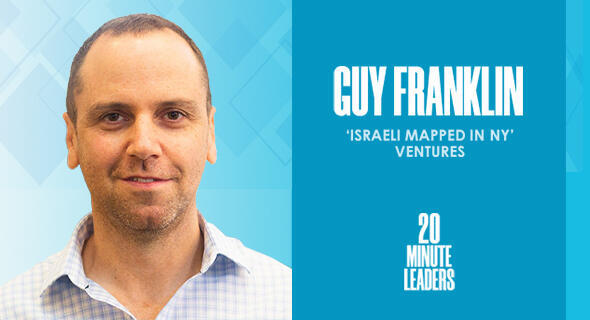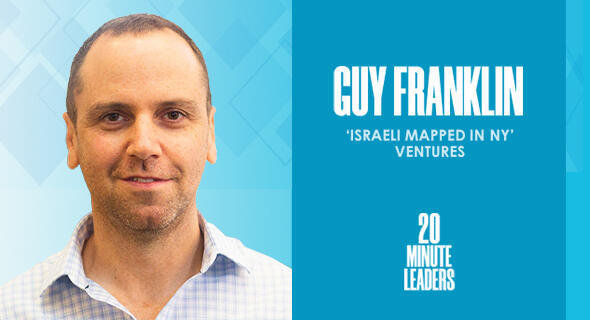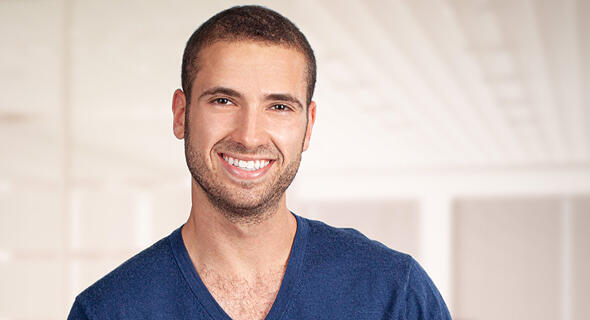
20-Minute Leaders
“The ecosystem already existed; I just connected it.”
What began as a weekend hobby has turned into a thriving business for Guy Franklin, founder and general partner at Israeli Mapped in New York.
What began as a weekend hobby has turned into a thriving business for Guy Franklin, founder and general partner at Israeli Mapped in New York. Franklin built a platform to show where Israeli startups were located in New York, allowing the existing ecosystem to truly connect and grow. New entrepreneurs had a place to find support as they arrived, and he found that many Israelis were turning to the platform to find new career opportunities as well. The next step for Israeli Mapped was to connect investors to companies. Franklin shares that even though he gathers private investors together to make relatively modest investments, his connections provide a lot of value to the companies, which is what they are looking for. One thing he’s learned is that running a U.S. startup from Israel doesn’t work well: being physically present is important for success.
Click Here For More 20MinuteLeaders
The journey that you're on, from an accountant to now managing an incredible ecosystem and making amazing investments with Israeli Mapped in New York, is such an awesome journey.
I relocated to New York 10 years ago to work as an accountant in EY after working in EY in Tel-Aviv for seven years. What I realized in my first year or two here in New York is that there was a huge trend that started back then of Israeli startups relocating to New York City.
My day job was at EY, but on the weekends, I decided to build a platform in order to map the Israeli startup ecosystem in New York: a simple, interactive map that shows pins on the map of New York with all the Israeli startups that are operating in New York.
Why do that?
First, it was to show the Israeli success to the world. There were then 56 Israeli startups here in New York. Today, by the way, there are over 350 Israeli startups in New York. To show that the Israeli ecosystem has roots, not only in Israel, but also here in New York.
The second reason, which is more important, was to connect the entrepreneurs, the founders, and the Israeli ecosystem in New York. I felt that there were groups of founders that knew each other, but not everyone was connected.
The platform I created is online, but the activities I did physically here in New York on the ground gave the platform its validity. I connected the founders and invited them. The goal was to have a smooth landing pad for future entrepreneurs and to help the existing ones here in New York.
From the work that you'd done up until that point, what did you learn about the Israeli ecosystem, about New York, that is not very trivial?
New York is a global place. There are startups from all over the world. But I realized that the Israeli ecosystem and the Israeli founders—not only the founders, the executives, and also the other employees—they are different from other communities. They would like to help each other, really support each other. Even for free. If there is an entrepreneur that built a company 10 years ago, he will do everything he can to support a young entrepreneur.
There were a few startups from a country in Europe and they wanted me to reach out to someone who made it very big from the country here in New York. When I talked with him, he told me, "I don't want to be associated with my region." It was crazy to hear that.
In Israel, it's the opposite. If I reach out to a founder and I invite him to talk with a group of Israeli founders, of course, they will come. The Israeli startup ecosystem is very unique. I learned that a lot of people would like to connect and they're looking for these opportunities.
Also, I found out that almost every Israeli that is looking for a job in New York is looking at the platform and reaching out to me. When I built it, I didn't think about the talent side or the jobs. I found out that investors that are looking to invest specifically in Israeli startups, they see the platform, they reach out to me and ask for my advice. I will not say that I built the ecosystem, because it existed; I just connected it.
You didn't stop just at facilitating the ecosystem; you actually took an active role in the financial side of things. Where did the investing in startups and forming groups to create positive investment strategies come from?
Israeli Mapped in New York started with a platform that I did in addition to my day job. After EY, I was the managing director of SOSA, New York.
Over the years, what I saw was that the entrepreneurs that I supported in so many aspects when they just started in New York, now they have expanded; they are in the growth stage. I realized that the organic growth of Israeli Mapped in New York is not only to support them in different connections: why not take it to the next level and invest in these companies and continue to bring them value here in New York?
Today, I would say that companies are looking for value and not only for money. I was at the right point in time when I started and I decided to invest in the companies. I'm putting in small amounts; in a round of between $20 to $30 million, I put in around between $500K to $1 million. The goal is to bring value. He doesn't need my money. If I invest in this company, then I will put all my efforts in order to support these specific companies here in New York.
For example, I invested in AVO, a fast-growing company. I brought in a group of angel investors under my umbrella. That's the way I'm doing it. I don't have a VC; I don't have a fund. I have a large network of private investors. I'm bringing the most relevant ones for the investments.
Was this a part of the goal to become an investor 10 years later to lead this ecosystem? Was this where you were trying to head when you moved to New York?
Completely not. The goal was to be in EY for two, three years, and go back to Israel. And I never imagined that I would do what I'm doing now. When I built the Israeli Mapped in New York platform, it was not my day job. If someone would have told me that in a few years, Israeli Mapped will be my business, I would laugh. But it was growing organically with me and with the ecosystem.
In 2022, I plan on making additional investments. In addition to the investments, there is a huge demand from VCs, from different Israeli entities, from service providers even, from companies for connections to potential clients and corporates, banks, and insurance companies. I thought they would reach out to me to help them in sales, connections to potential clients. But the first thing they need is talent. There is a competition today on talent. With some other companies that I'm now in conversations with in order to invest in them, we are talking about the value I can give them here in New York, and talent is the first priority.
If you're looking toward the future, how do you see this community running? What do you see happening as we're moving forward and we're getting into a more globalized world?
During the COVID time, there were a few articles I read in the Israeli media about the fact that Israeli founders don't need to relocate to the US anymore because they can work from Israel. But I would say that nothing will replace the physical presence here in New York for the companies.
I can give you one example, Aura Air. It's an Israeli startup based here in New York. The founder relocated two months ago. He just told me that before, he thought that he could do it remotely and come from time to time, but the impact of being here is, in his words, "dramatically changing the way the company acts."
I think that sometimes it's convenient for some of the founders to say, "Now it's a different world. I can do it from Israel." The globalization, it's there. But you have to be on the ground in order to succeed and scale in your business. There's no doubt about it.
Michael Matias, Forbes 30 Under 30, is the author of Age is Only an Int: Lessons I Learned as a Young Entrepreneur. He studies Artificial Intelligence at Stanford University, is a Venture Partner at J-Ventures and was an engineer at Hippo Insurance. Matias previously served as an officer in the 8200 unit. 20MinuteLeaders is a tech entrepreneurship interview series featuring one-on-one interviews with fascinating founders, innovators and thought leaders sharing their journeys and experiences.
Contributing editors: Michael Matias, Megan Ryan















